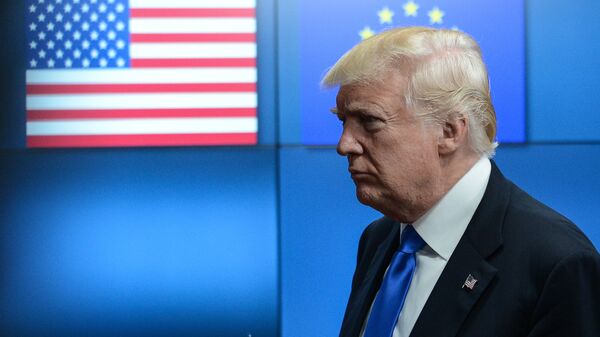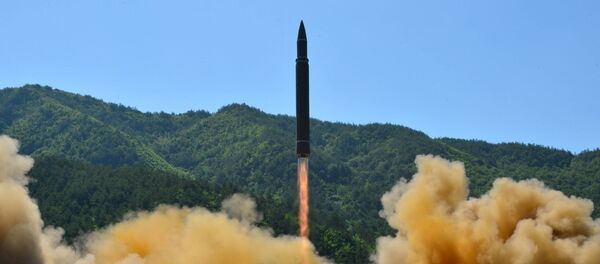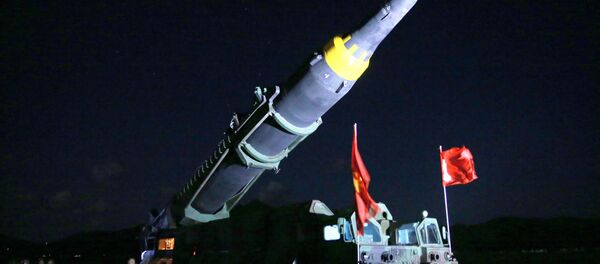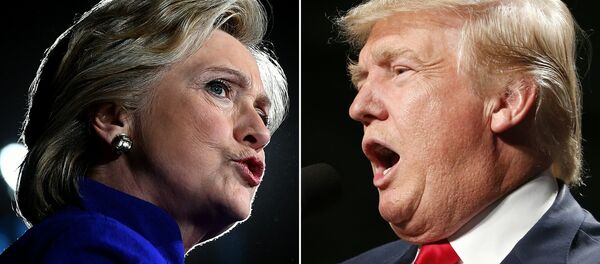North Korean Supreme Leader Kim Jong-un "has been very threatening beyond a normal state," Trump said, adding "they will be met with the fire and fury and frankly power, the likes of which this world has never seen before," before concluding his remarks by saying "thank you."
The latest round of saber-rattling comes as reports surface from Japanese and US intelligence indicating that North Korea has finally obtained nuclear capable ICBMs.
US intelligence analysts have informed the Washington Post that the Defense Intelligence Agency completed an assessment in July indicating North Korea has achieved its goal of building ballistic missile-equipped nukes. A white paper from Tokyo leaked Tuesday indicates Japanese intelligence has come to a similar conclusion.
The “IC [intelligence community] assesses North Korea has produced nuclear weapons for ballistic missile delivery,” according to the report shared with the US media outlet. This capability includes “delivery by ICBM-class missiles,” the DIA report says.
In a separate 500-page report, the Japanese Defense Ministry said Pyongyang’s “development of ballistic missiles and its nuclear programme are becoming increasingly real and imminent problems for the Asia-Pacific region including Japan, as well as the rest of the world.”
It is “conceivable,” Japanese analysts said, that “North Korea’s nuclear weapons program has already considerably advanced and it is possible that North Korea has already achieved the miniaturization of nuclear weapons into warheads.”
US Air Force Gen. Paul J. Selva recently advocated for the US to expand its own arsenal of mini, or low-yield, nukes.
DIA has made statements in the past that have contradicted stated US goals or positions. In May, for instance, DIA Director Gen. Vincent Stewart told the Senate “Kurdish independence is on a trajectory” that would make a formal assertion of Kurdish independence in Iraq a matter of when, not if. A referendum is slated to take place at the end of September where Kurds in northern Iraq will vote on whether to form a fully-independent state—a move that would shake Baghdad, Tehran and Ankara, and apparently some of Stewart’s colleagues in Washington.
On July 13, US Special Envoy Brett McGurk told reporters at the State Department that “having a referendum on such a fast timeline, particularly in disputed areas, would be, we think, significantly destabilizing.”
Since 2004, the Office of the Director of National Intelligence (ODNI) has been responsible for relaying critical intelligence assessments to the US president. After the September 2001 attacks, CIA took some blame for the failure to predict and stop the attack, and lost its role as Director of Central Intelligence, at the time the primary liaison between the president and the intelligence community.
Thus, reports prepared by ODNI are technically where one would find statements like “The IC assesses.” The IC includes everyone from the US Coast Guard Intelligence, CIA, NSA, and more obscure departments like National Geospatial-Intelligence Agency. The presence of the phrase “the IC assesses” may indicate that this is not actually a DIA report, but a brief compiled across the US intelligence community; that is, an ODNI report.
The Post was only given access to sections of the report, so it is unclear whether alternative or dissenting viewpoints were included and what they might be.
Furthermore, the Post states the information is from a "confidential assessment." The Post says "the assessment’s broad conclusions were verified by two US officials familiar with the document," but admits "the DIA and the Office of the Director of National Intelligence declined to comment."
Stanford’s Siegfried Heckers has suggested North Korea’s nuclear stockpile stands around 25 weapons and that Pyongyang can build six to seven more per year. The Post cited the Bulletin of the Atomic Sciences Nuclear Notebook, the Federation of American Scientists and the DIA to support their statement that “experts estimate [North Korea has] 30 to 60 nuclear warheads.”
The Trump administration has vowed to go after leakers of documents such as these. In comments that sparked concerns for future whistleblowers and the freedom of the US press, US Attorney General Jeff Sessions declared last week, "For our friends in the intelligence community: the Justice Department is open for business. And I have a warning for would-be leakers: don’t do it."






